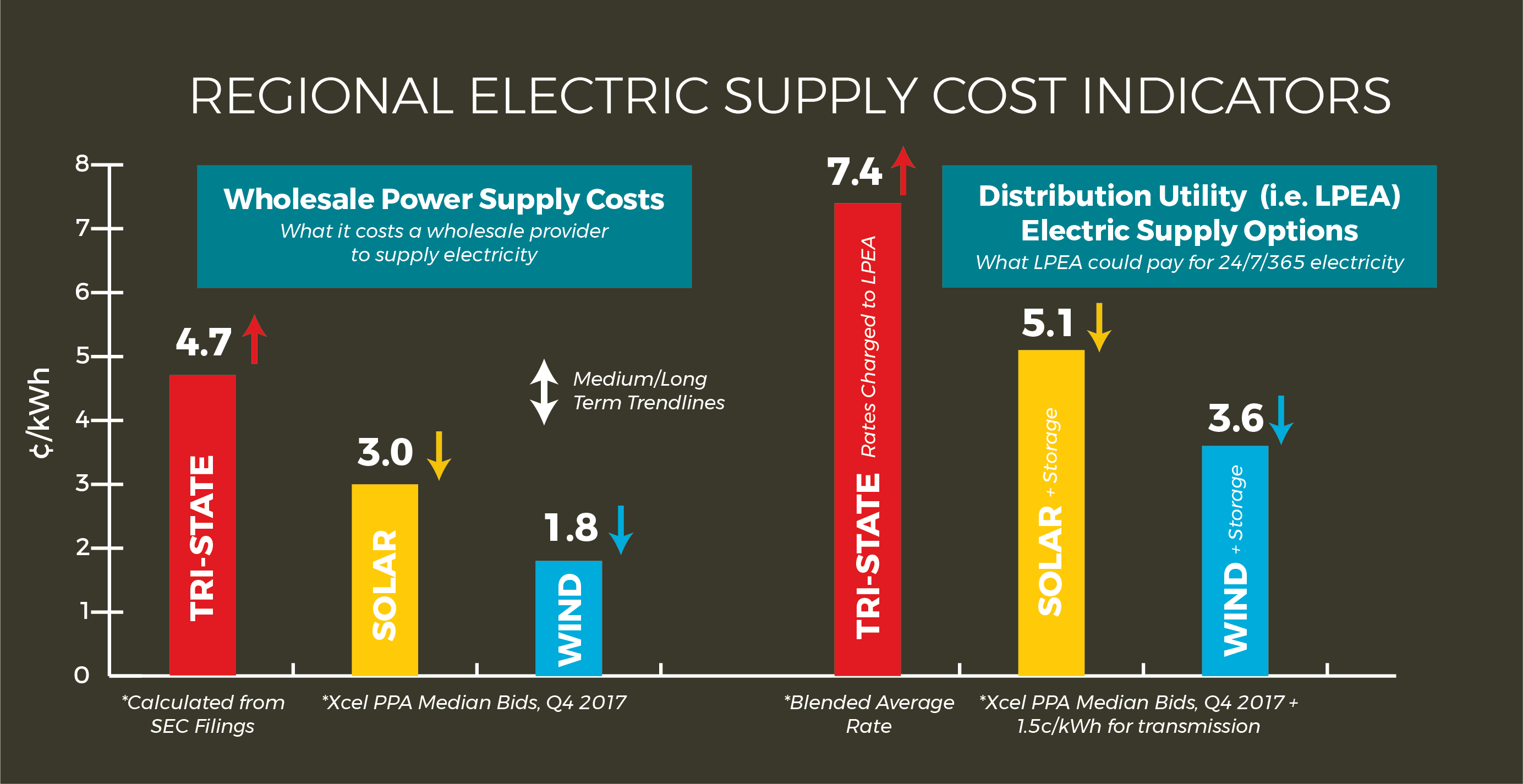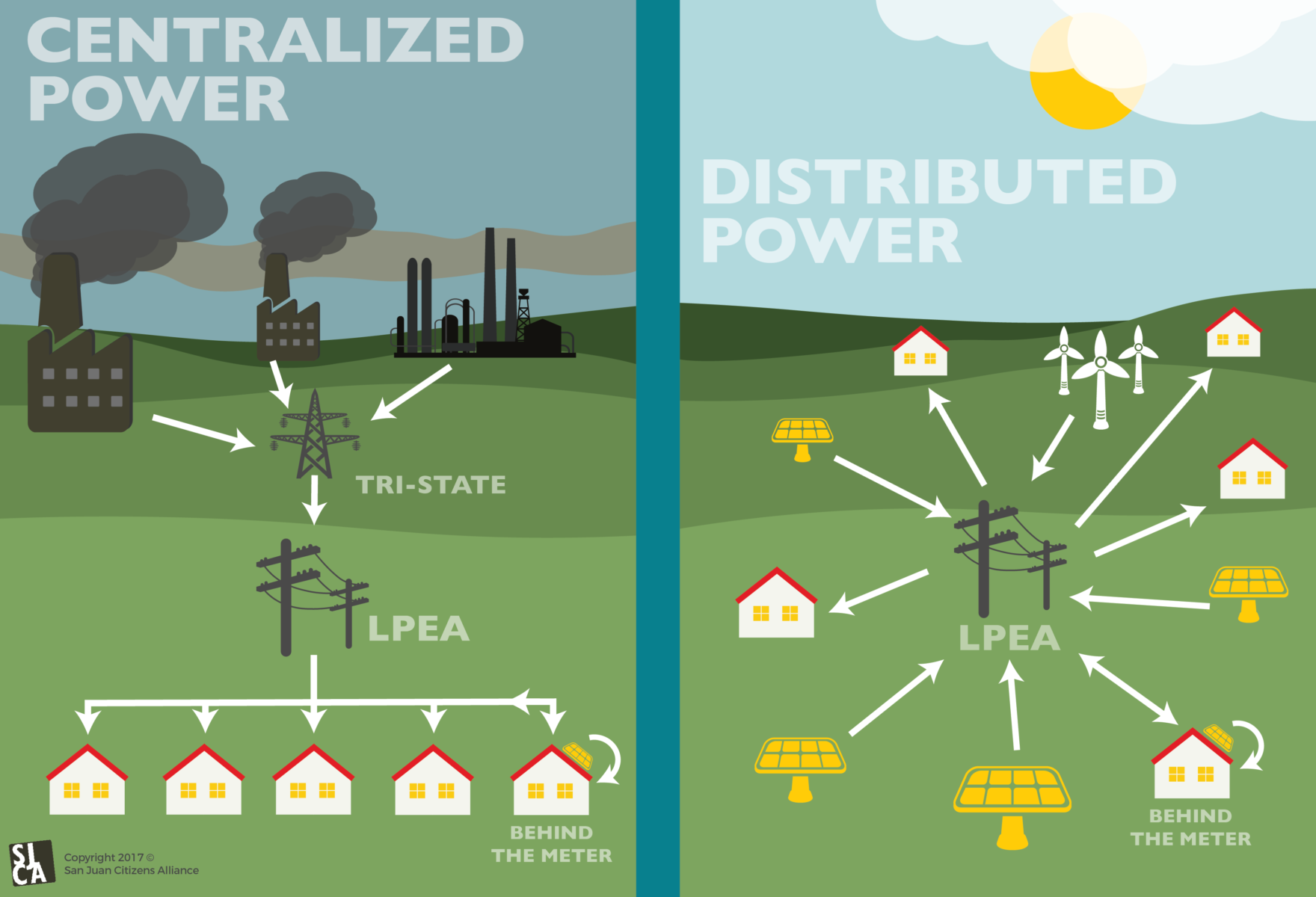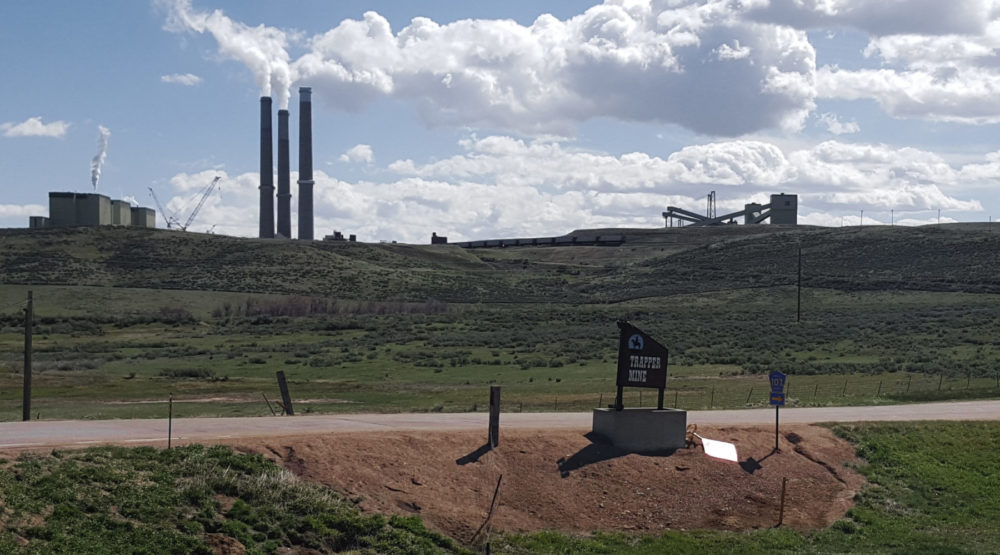We’re tracking LPEA, the rural electric co-op for La Plata and Archuleta counties, as they grapple with a new energy economy. Photo: Alex Pullen.
2025 LPEA ELECTION
Let's maintain LPEA’s momentum towards its new, lower cost, independent energy
supply. Show your support for these candidates in LPEA's election!
- District 1 – Holly Metzler (Archuleta County)
- District 2 – Terry Greiner (Southern La Plata County)
- District 3 – Joe Lewandowski (City of Durango)
- District 4 – John Witchel (Northern La Plata County)
Everything you need to know about La Plata Electric Association (LPEA)
Did you know renewable energy costs in Colorado are now on par with coal!?
Unfortunately, La Plata Electric Association (LPEA) is in an increasingly expensive contrac
Our community should look into ways to use renewable energy to secure our power sources, clean up our environment, improve public health, boost our the local economy, and lower electricity rates for everyone.
Fortunately, each member owner of LPEA (anyone with an LPEA electricity bill) has the power to shift the conversation by engaging with, and electing, LPEA Board Directors. Democratic participation is key as the election cycle continues on and the current LPEA board grapples with planning for the future. Additionally, the LPEA board recently voted to move forward with a partial buyout from its contract with Tri-State, which, if approved by the Federal Energy Regulatory Commission, will dramatically reduce LPEA’s emissions and cost! Stay up-to-date during this exciting time by following our social media posts and attending LPEA board meetings on the 3rd Wednesday of each month.
FUN FACT: The new power supply contract will reduce LPEA’s carbon footprint by 50%.
This means we will reduce our CO2 by 750 million pounds per year. That is equivalent to taking more than 71,000 vehicles off the road each year. For context, La Plata and Archuleta counties only have 57,000 total registered vehicles.
We must ditch coal powered electricity.
What can we do?
- Ask your federal representatives to help free our rural electric cooperatives from coal.
- Attend your local cooperative board meeting and urge your board members to ditch coal.
- Take action on the TriHarder webpage.
We have an opportunity.
Renewable energy is the future.
The energy industry is rapidly changing. Renewable energy and energy storage prices continue to drop in Colorado and are now on par with, or below, the cost of fossil fuels. This means that we can finally clean up our environment, protect public health, boost local economies and lower electricity rates.
Lower electricity rates.
Until the partial buyout from the LPEA/Tri-State contract is approved and finalized, LPEA is required to purchase 95% of our electricity (mostly coal) from Tri-State Generation and Transmission.
After the buyout is finalized, LPEA will still purchase half of its electricity from Tri-State. For a long time, this model of centralized coal was the cheapest way to produce energy, but in 2017 that changed.
Boost our economy.
For decades, buying electricity from large, centralized power plants was the cheapest option. But rapidly changing renewable energy technologies promise a new model. Distributed, utility-scale renewables are now able to produce power within the communities they serve.
We send over $70 million each year out of our local economy to pay Tri-State for our electricity. If we could generate 10% of our electricity locally, we could keep $6 million recirculating within our community and creating jobs. And it’s feasible. The cooperative in Taos, NM is already on its way to generating 40% of its electricity from local solar.
Combat pollution.
Producing electricity is the largest source of climate emissions in the United States. Majority coal supplied, Tri-State is the worst carbon emitting utility in the country per unit of energy produced.
Furthermore, coal-produced power specifically is known to contribute to 4 of the 5 top causes of death in the U.S.
LPEA’s mission statement claims it “provides its members safe, reliable electricity at the lowest reasonable cost while being environmentally responsible.” If renewable energy is now more affordable, LPEA has a fiduciary duty to pursue it.
What’s the obstacle?
LPEA’s hands are tied.
Communities and utilities throughout the West are mobilizing to take advantage of the declining cost of renewable energy while southwest Colorado sits idly by. In our current contract, LPEA is required to buy 95% of our electricity from Tri-State until 2050 and after the buyout is approved and finalized, that number will drop to 50%. There are multiple ways LPEA could diversify our energy sources, gain local control, and lower electricity rates for everyone, but right now their hands are tied. Learn more below.
HIGH
electricity rates.
Tri-State’s rates have gone up an average of 2.9% per year over last 10 years. Our local rates are already “in the upper range when compared with other electric coops and muni’s.”
Tri-State doesn’t need new sources of power until 2025. But their existing large fossil fuel investments have contributed to their current debt of over $3 billion.
RESTRICTIVE
supply contract.
LPEA is in a contract that forces us to buy 95% of our electricity from Tri-State until 2050.
In the winter of 2022, the LPEA Board voted to move forward with a partial buyout from its contract with Tri-State, which, if approved by the Federal Energy Regulatory Commission, will dramatically reduce LPEA’s emissions and cost! (Learn More)
What do we want?
A forward thinking-board.
LPEA’s elections are critical, and it’s important that each member-owner’s voice is heard! As energy technologies rapidly change, finding the right path for LPEA will require vision, effort, research, and debate. In the last few years, LPEA made huge strides toward an affordable and sustainable energy future, but there is still so much work to be done.
LPEA’s Board is in charge of making decisions that impact the co-op for years to come. It is essential that we elect a Board ready to ask hard questions and tackle new challenges.
What can we do?
Keep the momentum going.
LPEA has a majority of Board members willing to research renewable opportunities, and over the past year, they have been advocating for change. It is the LPEA Board’s job to look to the future – let’s make sure we have Directors willing to research our options and challenge the status quo.
As member-owners of LPEA, we have a responsibility to hold the LPEA Board of Directors accountable and elect new candidates who will provide effective leadership.
TALK TO YOUR LPEA DIRECTORS
Hover over your neighborhood to learn who represents you on the board! Give them a call or send them a note!
Did you know that La Plata Electric Association*(LPEA) is a rural electric cooperative? Cooperatives, or “co-ops,” are different from utilities in that they are owned and run by the customers rather than investors.
LPEA is a democratically run organization. Every year, the owners (a.k.a. customers like you) elect directors to the LPEA board. Those directors then determine the policies and overall directives of the co-op for us.
Contact your representatives and let them know which issues you care about (i.e. local renewable energy, low rates, or electricity reliability).



